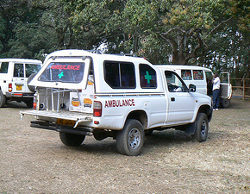Blantyre, Malawi … The plane touched down on the short 7,628 foot (2,325 meter) runway at the Chileka International Airport, located nine miles northwest of the commercial city of Blantyre in southern Malawi. Its contents include $1 million (180,000,000.00 Malawi Kwacha) in medicine that is badly needed by one of the poorest, least developed nations on earth.
During the same week another 40-foot trailer of medical supplies were unloaded at the Malawi Project’s southern warehouse at the Namikango Maternity Hospital and Mission in Thondwe. The value of the truck shipment has been valued at approximately $600,000.00. This makes the total of the two shipments approximately $ 1,600,000.00. Both shipments had the same destination, and have been made possible through a joint effort of Universal Aide in Canada, World Emergency Relief, and the Malawi Project in the United States, and the Namikango facility.

Included in the group picking up drugs and supplies was the Kamuzu Vocational Rehabilitation and Training Centre Clinic. This center is located deep in a remote part of southern Malawi. Opened in 1984, the center trains physically challenged people in different vocational venues, in order for them to become economically independent. It’s clinic serves the staff, students and village community surrounding its location, and treats over 200 patients a month. Drugs such as Albendazole, Amoxillin, Doxycline tablets, Multivitamins and SP were among the items arriving on the air shipment. These drugs help reduce the suffering of many people in area villages.
Another beneficiary of the drug shipment is the Malawi Prison system, and its headquarters facilities at the Zomba Central Prison. This facility is the biggest prison in the country, and is home to over 2,000 inmates. Like many other facilities in the country, the prison hospital lacks drugs, supplies and equipment. Unlike other Malawians who have the freedom to choose where to get medical attention, the inmates have little or no choice. This emphasizes the need for a continual flow of supplies to the prison. Moses Chigayo is the Malawi Prisons Services Clinical Officer, and is the official responsible for all prison infirmaries.
